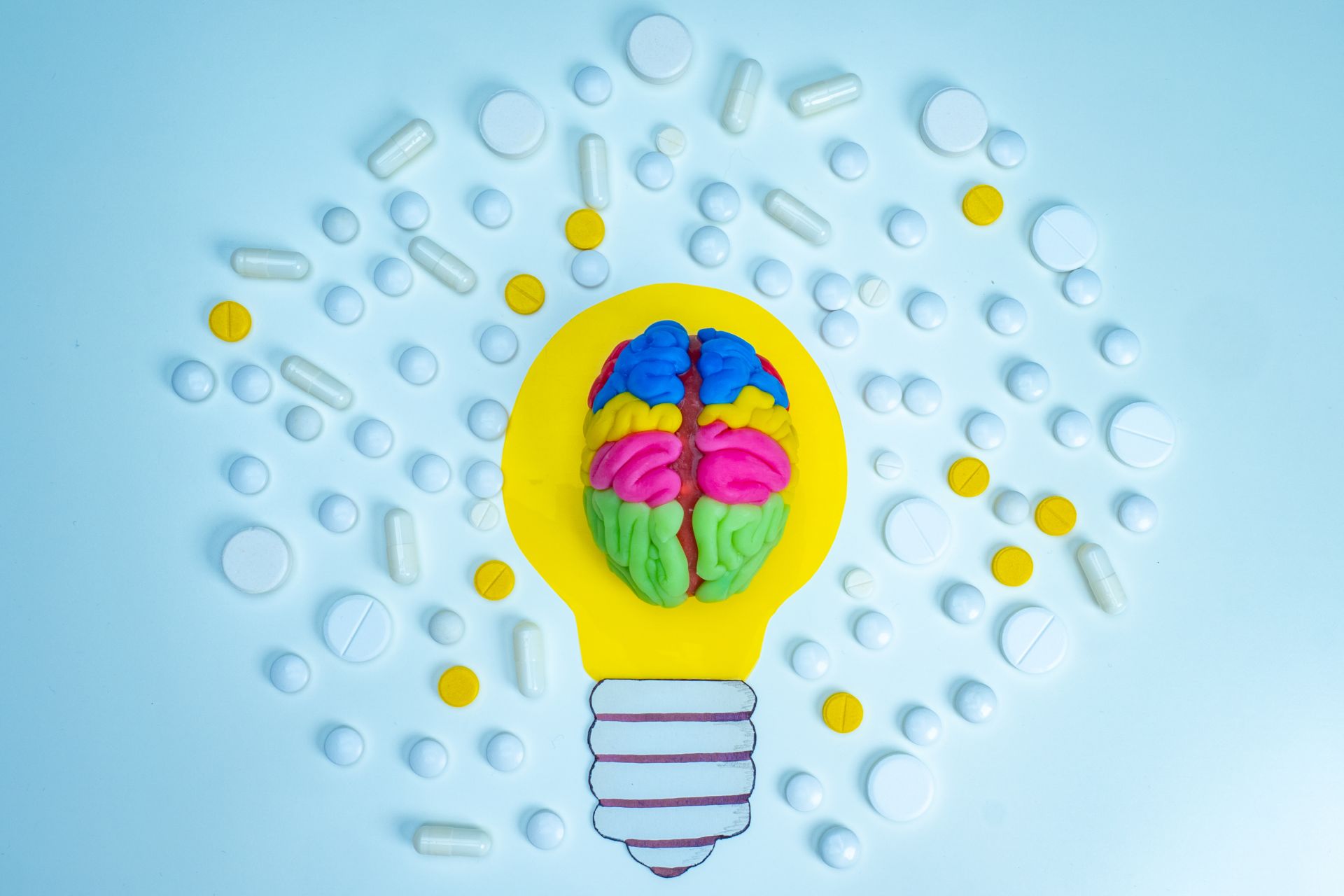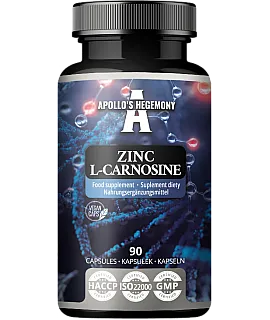Zinc and the endocrine system - what are the relationships?

Many endocrine systems are dependent on zinc. When it is lacking, ugly complications can arise in many hormones. Zinc affects sex hormones, thyroid hormones, growth hormone, insulin, melatonin and many other important hormones. Zinc deficiencies, unfortunately, occur quite frequently, and not only in developing countries. Even in developed societies, it is possible to suffer endocrine disorders associated with zinc deficiency when we do not pay attention to the supply of zinc in the diet. In this article, we will explore the effects of zinc on the function of various hormones and endocrine systems in the human body. Read to the end!
- How does zinc affect hormones?
- Zinc as a male element, or effects on testosterone
- Zinc and thyroid hormones
- Zinc and insulin and sugar metabolism
- Zinc vs. neuropeptide Y and leptin
- Zinc and melatonin
- How to supplement zinc to support hormonal health?
- Summary
How does zinc affect hormones?
Zinc metabolism affects the physiological and biochemical levels of many hormones. Therefore, growth disorders, hypogonadism and some endocrine diseases have been linked to zinc deficiency. In terms of hormonal regulation, zinc is very versatile.
Zinc increases the synthesis of growth hormone and the number of its receptors, so it is an important mediator in the binding of the hormone to its receptor. Found in large amounts in pancreatic tissue, zinc is involved in the regulation of insulin action. It participates extensively in the metabolism and action of thyroid hormones. Low zinc levels and high leptin levels in obese individuals indicate a critical link between zinc and leptin. Zinc has been linked to the activity of enzymes responsible for melatonin synthesis, and melatonin has a regulatory effect on zinc absorption from the gastrointestinal tract. Zinc also specifically affects behavior
Given the above relationships, it is assumed that zinc plays a key role in many endocrine systems. Below we will do a more detailed review of zinc's interactions with key endocrine systems.
Zinc as a male element, or effects on testosterone
Zinc is present in almost every enzyme system and plays a key role in the male reproductive system. Men derive a lot of benefits from the presence of zinc. It is needed for the proper production of testosterone and for maintaining normal prostate function.
The link to masculinity lies at the very beginning of zinc's history in medicine. Dietary zinc deficiencies in humans were first described by Dr. Prasad in 1963, at which time it was suggested that zinc deficiency might be responsible for growth retardation and hypogonadism in adolescent boys in Egypt. Zinc supplementation was introduced to these boys for a period of 12 to 24 months, which resulted in the development of secondary sexual characteristics, and both hypogonadism and growth retardation were eliminated. In all cases!
Zinc affects male hormones on two levels:
- regulates the production of gonadotropic hormones (LH and FSH) in the brain;
- It acts directly in testicular tissue.
Some studies have seen a link between zinc availability and LH production in the pituitary gland, the hormone that transmits the signal from the brain to the testes to produce testosterone. The analogy is with the production of FSH, the hormone that initiates spermatogenesis. Thus, to some extent , zinc influences****a male fertility. It is known to ensure the integrity of the sperm membrane, increase sperm motility, the helezonic movement of the sperm tail. Zinc can often be spotted in the formulations of dietary supplements aimed at improving fertility.
In addition to its action in the testes , zinc is also involved in androgen production by the adrenal glands via the angiotensin-converting enzyme (ACE).
Zinc particularly affects the conversion of testosterone to dihydrotestosterone (DHT), since the 5α-reductase involved in this conversion is a zinc-dependent enzyme. Zinc deficiency can additionally impair the function of androgen receptors, so the effect on androgens is truly multifaceted.
Zinc and thyroid hormones
Thyroid hormones play an important role in body homeostasis, facilitating lipid and glucose metabolism, regulating metabolic adaptations, responding to changes in energy intake and controlling thermogenesis. Proper metabolism and function of these hormones requires the contribution of various nutrients. Among them is zinc, whose interaction with thyroid hormones is complex.
There are many hypotheses that explain the explanatory effects of zinc on thyroid hormone metabolism. The mechanisms by which zinc affects thyroid performance include:
- synthesis of signaling hormones in the brain (TRH and TSH),
- synthesis of thyroid hormones,
- T4 to T3 conversion efficiency,
- production of carrier proteins.
Zinc deficiency not only impairs the rate of thyroid hormone synthesis, but can also exacerbate atrophy of this organ and degenerative changes. In this aspect, the antioxidant property of zinc is of great importance.
Zinc is thought to be essential for the function of thyroid hormone receptors, particularly triiodothyronine (T3). The T3 hormone receptor needs zinc to maintain its biologically active state. By increasing the production of thyroxine-binding protein, zinc can affect T4 hormone levels. Also dependent on zinc is type I-5' deiodinase, an enzyme necessary for the conversion of T4 to T3. In the case of zinc deficiency, the efficiency of converting T4 to active T3 hormone decreases significantly.
Various studies have noted that, statistically, hypothyroidism is associated more with zinc deficiency, and hyperthyroidism, on the contrary, with an excess of this element.

Zinc and insulin and sugar metabolism
Insulin is stored in the β-cells of the pancreas in the form of zinc-containing crystals. Zinc is not only present in the structure of insulin, but also has a critical effect on its biological activity. The insulin-like properties of zinc are evidenced, among other things, by the fact that glycemic control in diabetics and animals has been maintained by zinc supplementation. Zinc influences the process of glucose transport into the cell by cooperating with the enzyme insulin-responsive aminopeptidase (IRAP), which is expressed in muscle and adipose tissue. IRAP is essential for the proper function of the glucose transporter GLUT-4.
Zinc vs. neuropeptide Y and leptin
These two hormones are heavily involved in the regulation of appetite. Zinc affects both.
Loss of appetite and impaired taste perception are some of the most characteristic signs of zinc deficiency. This deficiency can even predispose to the development of anorexia nervosa. Increasing the amount of zinc in the diet with the help of supplementation, among other things, is one of the elements supporting recovery and weight gain. Underlying such an effect is most likely an effect on neuropeptide Y, more specifically, its reduced secretion, impaired conversion to the active form and impaired signaling.
On the other hand, we have a link between zinc and leptin, a hormone known for triggering feelings of satiety, among other things. The study noted that zinc deficiency critically inhibits leptin secretion from adipose tissue, and IL-2 and TNF-α levels showed a significant decrease in parallel to the inhibited leptin levels. It was observed that subjects in the study showed a significant increase in leptin secretion after zinc supplementation, as well as a significant increase in IL-2 and TNF-α concentrations. Zinc deficiency by decreasing leptin secretion and inducing leptin resistance may predispose to obesity.
Zinc and melatonin
The relationship between zinc and melatonin is very cordial; they help each other. Melatonin facilitates the absorption of zinc in the gastrointestinal tract, while zinc helps the pineal gland produce melatonin. In experiments on rodents, it was noted that simply manipulating the availability of melatonin had a significant effect on the amount of zinc in the body.
Zinc is involved in the synthesis of serotonin, which is the "happiness hormone," but also a precursor to melatonin production. Practical experiments confirmed that zinc supplementation increased the rate of melatonin synthesis in the pineal gland, while zinc deficiency leads to a decrease in the production of this "sleep hormone."
Especially among athletes, the practice of supplementing zinc at night is popular, and the effect on melatonin synthesis is probably one of the factors that justify this practice.
How to supplement zinc to support hormonal health?
The decision to supplement is well related to the baseline state of the diet and the severity of symptoms that could indicate a deficiency of this element. As a standard preventive health measure, 10-15 mg of zinc ions are used daily. In cases that require stronger intervention and faster replenishment of zinc levels, doses of 30-75 mg of zinc per day are sometimes used, and sometimes higher.
Zinc can be used as a monopreparation or in a complex with copper. The addition of copper is intended to facilitate the balance between the two minerals. There is a specific interaction between the two as they deplete each other's stores. Using zinc alone for too long, or using too high a dose, breeds the risk of copper deficiency, and this causes further health ailments.
Summary
The effects of zinc on hormones are downright impressive. Thyroid, sex hormones, sleep hormone, appetite-regulating hormones, insulin, growth hormone and IGF-1 all depend on the availability of zinc. Although its total amount in our bodies is only a few grams, its deficiency cannot be overlooked. Such an extensive impact on health makes it undoubtedly worth monitoring the supply of zinc in the diet, and supplementing with appropriate supplementation when necessary.
Sources:
 ⮜ Previous article
⮜ Previous article
How does creatine affect strength?
 Next article ⮞
Next article ⮞


